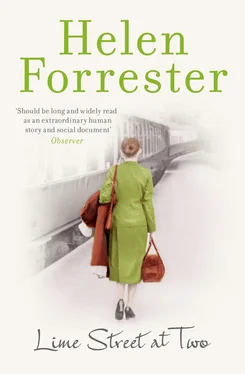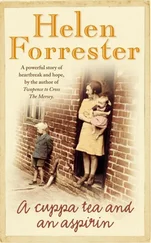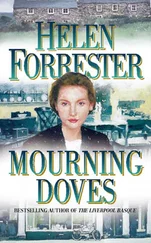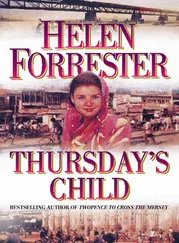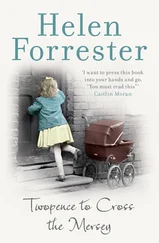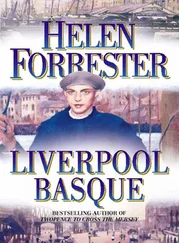‘No, I didn’t,’ Father answered. ‘Do you think we could find my spectacles? They fell off, as I went down. They must be just here somewhere.’
The stick was used to sweep the pavement round them, and the spectacles, fortunately unbroken, were returned to their owner. A very grateful Father was safely deposited on his own doorstep by a man who, in ordinary circumstances, would have been regarded as seriously handicapped.
Bearing in mind the distances I often had to walk, it was as well that I had inherited my mother’s stamina, if not her temperament; even so, the strain was very great.
In the safe knowledge that no one could see me, I would stumble along in the dark, weeping openly, and wishing I was dead. Yet, when a stick of bombs began to fall nearby, and the whistle of each succeeding missile became closer, I would instinctively duck for shelter in the nearest shop doorway and crouch down, hands clasped over head, until the last resounding bang. I discovered that to survive is a fundamental instinct of all living things, and in such situations instinct takes over.
Sometimes the planes would dive fast, one after another, and other pedestrians would dash pell-mell into my refuge, to huddle tightly round me, like sheep in a storm, until the danger had retreated. Then, with shy apologies and light jokes directed to unseen faces, we would issue forth again into the street.
While we sheltered, the blackness was occasionally lit by the unearthly green glow of flares floating slowly in the sky, while the Germans tried to locate their specific targets. For a moment we would see fellow shelterers in the greatest detail, and all of us would feel naked and helplessly exposed to our enemies in the sky. The flares and bursts of tracer bullets were in one way useful, however, because they gave us a sufficiently good view of our route that, when we all set out again, we were less likely to have a fall.
The flares also showed up ARP messenger boys racing recklessly along on their bicycles; regardless of danger, they sped from air-raid wardens’ posts, to hospitals, to fire stations and rescue squads, wherever a message needed to be delivered. Most of the boys were under seventeen years of age, too young for military service; yet nightly they took chances which even the military would have considered risky.
Motor traffic crawled along with heavily shaded lights; ambulances and fire engines rang their bells continuously. Lorry drivers, tram and bus drivers normally kept going until a raid was overhead, when they would park and take refuge in the nearest shelter. There were few private cars on the streets, because of petrol rationing; those out at night were, for the most part, carrying walking casualties, rescue squads, tradesmen like telephone men and electricians, air- raid wardens and medical personnel. More than one vehicle ended up in an unsuspected bomb crater in the middle of a road, the driver and passengers killed or injured.
So when my mother riffled through my handbag with her tobacco-stained fingers, to take my fare money, she created cruel hardship for me, and it was not only for my lost love that I wept.
When attacking convoys, particularly at night, the Germans began to use packs of U-boats working in unison, rather than single submarines. Although the escort ships of the convoys now had a listening device, called Asdic, with which they could detect the presence of submarines, the noise of the convoy itself often confused the listeners and made it difficult to identify a submarine with certainty. It was also ineffective if the U-boat was on the surface.
To avoid the Asdic device, the U-boat commanders would come up steeply into the middle of a convoy, and, in a few moments, create havoc. Then, still on the surface, they would race away into the darkness, outrunning the escorting corvettes.
Once my first grief over Harry’s death had become more controllable, I again began to feel very deeply for the frantic mothers and wives of merchant seamen and Royal Navy men, alike, who died during September, October and November of 1940. The women threatened to overwhelm our little office, with its limited resources.
During one dreadful Saturday morning, when weeping women stood in the waiting room because all the chairs were full, and queued along the passageway and stairs, I was so distressed that something seemed to break inside me, and I cried out in fury to a startled voluntary worker, ‘It’s madness to send men to certain death like this!’
The words rang through the crowded, untidy room, and all the voluntary workers stopped their bustle and turned to stare at me. My weary colleague, Miss Evans, seated at her desk at the hub of the turmoil, put her hand over the mouthpiece of the telephone, and said sharply, ‘Miss Forrester!’
In the ensuing dead silence, I mumbled, ‘I’m sorry.’
I snatched up a pile of files and began feverishly to put them back on their open shelves, my fury unassuageable. The tears coursed down my cheeks. ‘Why couldn’t seamen have enough sense to stay ashore?’ I raged inwardly. Most of them had skills which would have given them protected jobs in war factories. On the other hand, Harry had said that, if he had come ashore, he would have been called up, sooner or later, for the Army or the Navy; he might just as well remain a merchant seaman, and earn better wages.
Based on my utter frustration, a dull anger at Harry surged in me. He was old enough not to be amongst the first to be conscripted. We could have been married by now and had some happiness together; I could have been carrying his much desired baby. The fool! The stupid idiot, to go and get himself killed! I was terribly, unreasonably furious at him.
In those wild moments, I gave no thought to the fact that unless freighters went to sea, to carry on the country’s trade, we would soon starve. I also forgot that, though Harry often complained about the conditions under which seamen lived aboard ship, basically he enjoyed going to sea; like everyone else, he hoped the war would soon be over. Few civilians knew enough of the true situation to realise that it was bound to drag on for years. Wars are very easily started; the problem is in bringing them to a close.
Now Harry was gone, and I had not the faintest idea what to do, as I struggled to help women equally distressed. My mind refused to concentrate; my body longed for rest, preferably eternal rest. Normally I was always hungry; now I sometimes found it difficult to eat.
Even Mother noticed my unusual dullness and told me to stop looking so sulky. ‘Laugh and the world laughs with you,’ she would say, so truly, ‘Cry, and you cry alone.’
‘It’s easier for her,’ I would think sullenly. ‘She’s doing quite nicely now.’ I forgot that she had been through an earlier war, a war which had been in many ways much worse.
‘Why aren’t you going dancing?’ Fiona asked.
I looked at her blankly for a moment, and then replied, ‘I’m too tired – the office is so busy.’
I don’t think that Father noticed anything much. He tended to live a life of his own amongst his friends from the office; Mother never accompanied him either to the public houses or to the concerts and plays to which he went. Sometimes he would inquire of Tony or Brian what they were doing in their spare time. Not infrequently, he had a tremendous row with Mother, usually on the subject of money.
He may possibly have noticed that, at that time, I was not quarrelling much with Mother, and consequently the house was quieter. I was too exhausted to face her verbal barbs, and no matter what she did, I accepted it and did my best to cope with the consequences.
On the Saturday on which I had exclaimed so explosively in the office about the lunacy of the war, I worked all day, and arrived home just as Mother was putting on her retrimmed, turban-type hat before going to the cinema. She was peeking at herself in the broken piece of mirror on the mantelpiece. It was still the only mirror in the house and was consequently very precious. During the war, mirrors were hard to obtain.
Читать дальше
